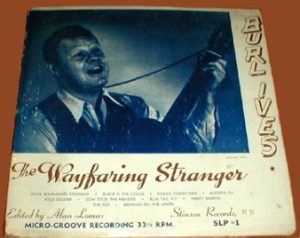By Donato Cabrera│medium.com/@donatocabrera
December 19, 2020

Burl Ives’s voice is still part of the American consciousness, but his story has been largely forgotten.

Burl Ives was born in Hunt City, Illinois, in 1909. In 1929, during his junior year at what is now Eastern Illinois University, he decided that he was wasting his time at university and dropped out to become an itinerant musician…and I mean itinerant. Throughout the early 1930’s, Ives traveled the country riding boxcars and earning a living by taking odd jobs and playing folksongs. He certainly had talent because in 1933 he had made his way to New York City and started studying at The Juilliard School. By 1938, he was singing a small part in Rodgers and Hart’s 1938 Broadway smash hit musicals, The Boys from Syracuse.
In 1940 he created what would become an incredibly popular radio show, The Wayfaring Stranger, and started singing with the Almanacs, a folk-singing group which often included Woody Guthrie, and Pete Seeger. The Almanacs were active in the American Peace Mobilization (APM), a far left organization that initially opposed the American entry into World War II and Franklin Roosevelt’s pro-Allied policies. However, when Nazi Germany invaded Russia in June 1941, the APM reorganized itself into the pro-war American People’s Mobilization and Ives and the Almanacs rerecorded several of their songs to show their support of US entry into the war.
Ives had a string of hits throughout the 1940’s, including the 1947’s, I’m Goin’ Down the Road, with the Andrews Sisters,
And an Academy Award nomination for Best Original Song for his version of the 17th century English song, Lavender Blue, for the 1948 film, So Dear to My Heart,
And was considered one the greatest exponents of American folk music.
However, in 1950, Ives was blacklisted for two years for being identified for having communist ties. In 1952, he was called before Joseph McCarthy’s House Un-American Activities Committee and, in order to save his career and end his blacklisting, agreed to testify. This led to an enormous rift between Ives and the folk singing community, particularly with Pete Seeger, who accused him of naming names and not standing up for cultural and political freedom. They would eventually reconcile, but Ives would never quite be accepted into the community with which he originally identified.
Ives’s career shifted to film and television and throughout 50’s and 60’s appeared in many movies and, of course, television specials. He was a naturally gifted actor and for the 1958 Western, The Big Country, Ives won the Academy Award for Best Supporting Actor.
After the enormous success of the 1964 television special, Rudolf the Red-Nosed Reindeer, in which he was the voice of Sam the Snowman, Ives decided to record a Christmas album. In October 1965, Ives released what is now considered one of the greatest Christmas albums of all time, A Holly Jolly Christmas.
